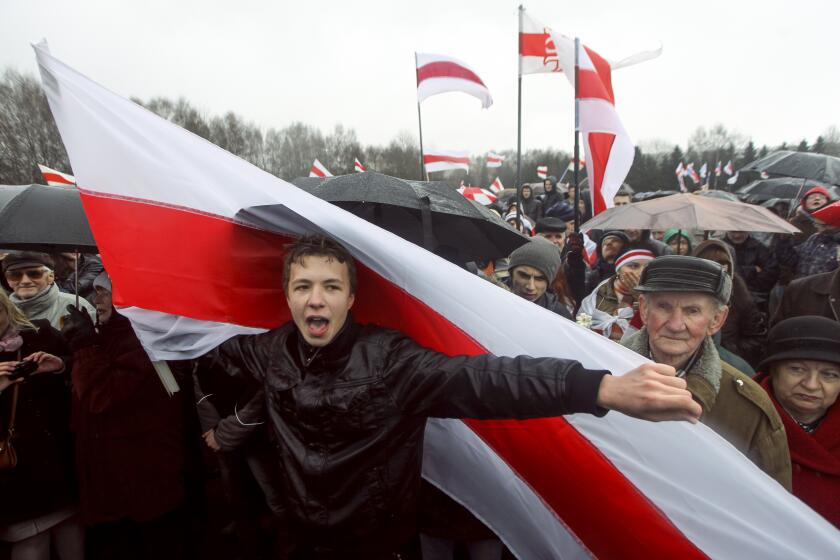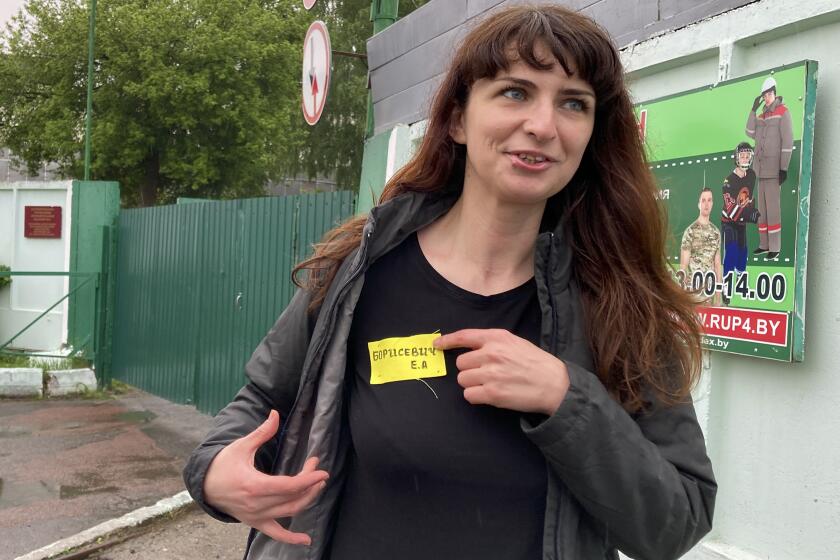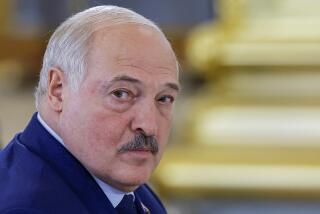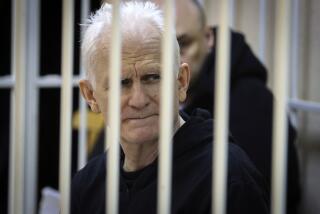Belarus dissident seized after plane’s forced landing is moved to house arrest
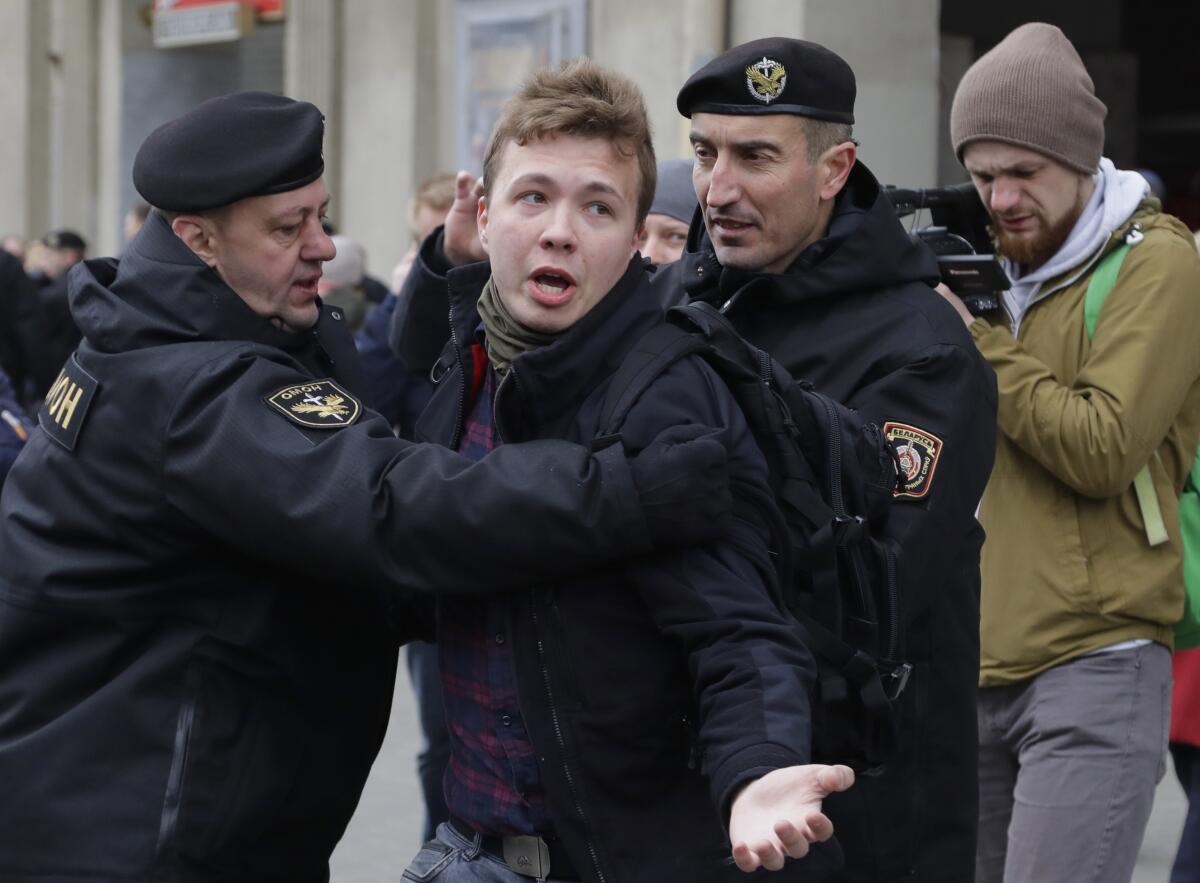
- Share via
KYIV, Ukraine — The dissident Belarusian journalist who was arrested after the forced landing of his commercial flight last month has been moved from jail to house arrest — “good news” but not freedom for him yet, according to Belarus’ exiled opposition leader.
Roman Protasevich — who ran a messaging app channel that was widely used during last year’s massive protests against Belarus’ authoritarian president — and his Russian girlfriend, Sofia Sapega, were seized May 23 after their flight from Greece to Lithuania was diverted to Minsk, the Belarusian capital, because of a purported bomb threat. President Alexander Lukashenko sent a fighter jet to escort the Ryanair plane to Minsk, where authorities promptly arrested Protasevich and Sapega.
The move elicited international outrage, and resulted in sanctions on Belarus by the U.S., European Union, Britain and Canada.
Both Protasevich and Sapega have remained in detention since. Protasevich, who faces a potential 15 years in prison, has been shown on state television expressing regret for his activities. The opposition has said he spoke under duress and showed signs of physical abuse.
Belarus’ Investigative Committee said in a statement Friday that Protasevich and Sapega were moved to house arrest after having cooperated with investigators and accepted a pretrial deal. It said that they “agreed to help investigators probe the crimes, expose their accomplices and do everything possible to compensate for the damage that was inflicted” and that the pair made “consistent confessional testimony.”
Opposition leader Sviatlana Tsikhanouskaya on Friday called moving Protasevich and Sapega to house arrest “good news,” but stressed it was not the end.
Roman Protasevich long feared that Belarusian authorities would try to abduct him, even though he had fled the country. They arrested him Sunday.
“House arrest is not freedom — they’re still facing charges, their every step is still being watched. It means they’re still hostages,” said Tsikhanouskaya, who fled from Belarus to Lithuania last year under pressure from the authorities.
She urged the West to maintain pressure on Lukashenko and keep pushing for the release of all political prisoners and for early elections, saying that sanctions have been having an impact.
Tsikhanouskaya said her team was in touch with Protasevich’s parents, who “aren’t given any information about their son, aren’t allowed to talk to him” and are “convinced that the regime is playing a game, using Roman and Sofia’s lives.”
Protasevich’s mother, Natalia Protasevich, told Poland’s TVN by phone that she had received no official word regarding her son or any change in the conditions of his detention. She said a move to house arrest is “likely an improvement in their living conditions. But I’ll repeat: None of the charges against them have been dropped. They remain hostages and captives just like before.”
Human rights activists say Belarus is sewing yellow tags on political prisoners’ clothes to single them out, in a move with echoes of Nazi Germany.
Sapega’s lawyer, Anton Gashinsky, confirmed to the Associated Press that she had been transferred to house arrest recently, without specifying when exactly it happened. She resides in a rented apartment in Minsk, and her parents met her Thursday at a restaurant.
Gashinsky said she wasn’t alone at the restaurant, but wouldn’t clarify whether she was with Protasevich.
Protasevich’s lawyer, Inessa Olenskaya, refused to comment on her client’s whereabouts and status, citing a nondisclosure agreement.
Belarus has been rocked by months of mass protests fueled by Lukashenko’s reelection to a sixth term in August, in an election that was widely seen as rigged. The authorities responded to the demonstrations with a massive crackdown that saw more than 35,000 people arrested and thousands beaten by police.
Start your day right
Sign up for Essential California for the L.A. Times biggest news, features and recommendations in your inbox six days a week.
You may occasionally receive promotional content from the Los Angeles Times.
Most opposition leaders have been jailed or forced to leave the country.
The U.S., the EU, Britain and Canada joined forces Monday to impose sanctions on several top Belarusian officials. The EU also imposed a series of bruising economic sanctions directed at key Belarus exports, including potash — a common fertilizer ingredient — and petroleum products.
Belarus’ Foreign Ministry has said the sanctions would hurt ordinary people and “border on the declaration of an economic war.” On Friday, the ministry again condemned the sanctions and promised “retaliatory measures” in the coming weeks.
“It’s about time European politicians realized that pressure and sanctions are not a language one should use with Belarus,” the statement read.
More to Read
Sign up for Essential California
The most important California stories and recommendations in your inbox every morning.
You may occasionally receive promotional content from the Los Angeles Times.
